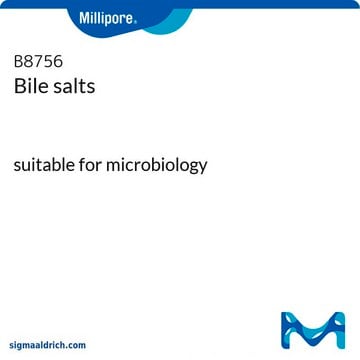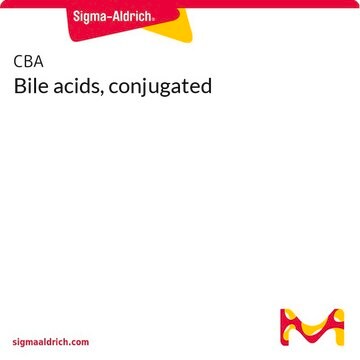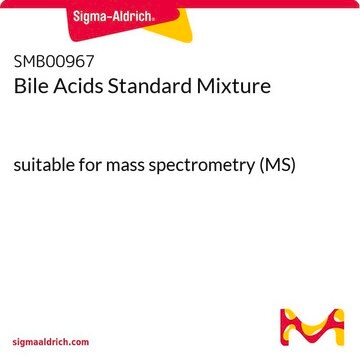B8381
Bile from bovine and ovine
bile acid mixture
Synonym(s):
Bile acids
Sign Into View Organizational & Contract Pricing
All Photos(3)
About This Item
Recommended Products
biological source
bovine
ovine
form
powder
technique(s)
microbiological culture: suitable
Application
Bile from bovine and ovine can be used in bacteriological research to investigate bile salt adaptation of bacteria such as Lactobacillus.
For bacteriological use.
Biochem/physiol Actions
The formation of bile acids from cholesterol is critical to cholesterol homeostasis. Subsequently, bile acids and alcohols function in the absorption of lipids from the GI tract. The class consists of a complex mixture of similar compounds, presenting a difficult analytical problem; LC/MS and GC/MS have been used successfully to elucidate such mixtures.
Components
Mixture of free and conjugated bile acids, minimum 50% bile acids
Storage Class Code
11 - Combustible Solids
WGK
WGK 3
Flash Point(F)
Not applicable
Flash Point(C)
Not applicable
Personal Protective Equipment
dust mask type N95 (US), Eyeshields, Gloves
Certificates of Analysis (COA)
Search for Certificates of Analysis (COA) by entering the products Lot/Batch Number. Lot and Batch Numbers can be found on a product’s label following the words ‘Lot’ or ‘Batch’.
Already Own This Product?
Find documentation for the products that you have recently purchased in the Document Library.
Customers Also Viewed
Erwann Hamon et al.
Journal of proteome research, 11(1), 109-118 (2011-11-02)
The identification of cell determinants involved in probiotic features is a challenge in current probiotic research. In this work, markers of bile tolerance in Lactobacillus casei were investigated using comparative proteomics. Six L. casei strains were classified on the basis
Fabiane Cristina Petry et al.
Food & function, 8(11), 3951-3963 (2017-10-04)
The composition of carotenoids (carotenes and free and acylated xanthophylls) and their bioaccessibilities were determined for the first time in pulps of mandarins cultivated in Brazil. Two cultivars of mandarin, Citrus reticulata Blanco cv. 'Ponkan' and Citrus reticulata × C.
A Paziewska-Harris et al.
The Journal of parasitology, 104(1), 96-100 (2017-11-03)
The long-term storage of Cryptosporidium life-cycle stages is a prerequisite for in vitro culture of the parasite. Cryptosporidium parvum oocysts, sporozoites, and intracellular forms inside infected host cells were stored for 6-12 mo in liquid nitrogen utilizing different cryoprotectants (dimethyl
Caroline Fässler et al.
European journal of nutrition, 45(8), 445-453 (2006-10-13)
Resistant starch (RS) is known for potential health benefits in the human colon. To investigate these positive effects it is important to be able to predict the amount, and the structure of starch reaching the large intestine. The aim of
A Paziewska-Harris et al.
Parasitology research, 115(7), 2873-2877 (2016-04-21)
Viability estimation of the highly resistant oocysts of Cryptosporidium remains a key issue for the monitoring and control of this pathogen. We present here a simple 'one tube' quantitative PCR (qPCR) protocol for viability estimation using a DNA extraction protocol
Our team of scientists has experience in all areas of research including Life Science, Material Science, Chemical Synthesis, Chromatography, Analytical and many others.
Contact Technical Service















